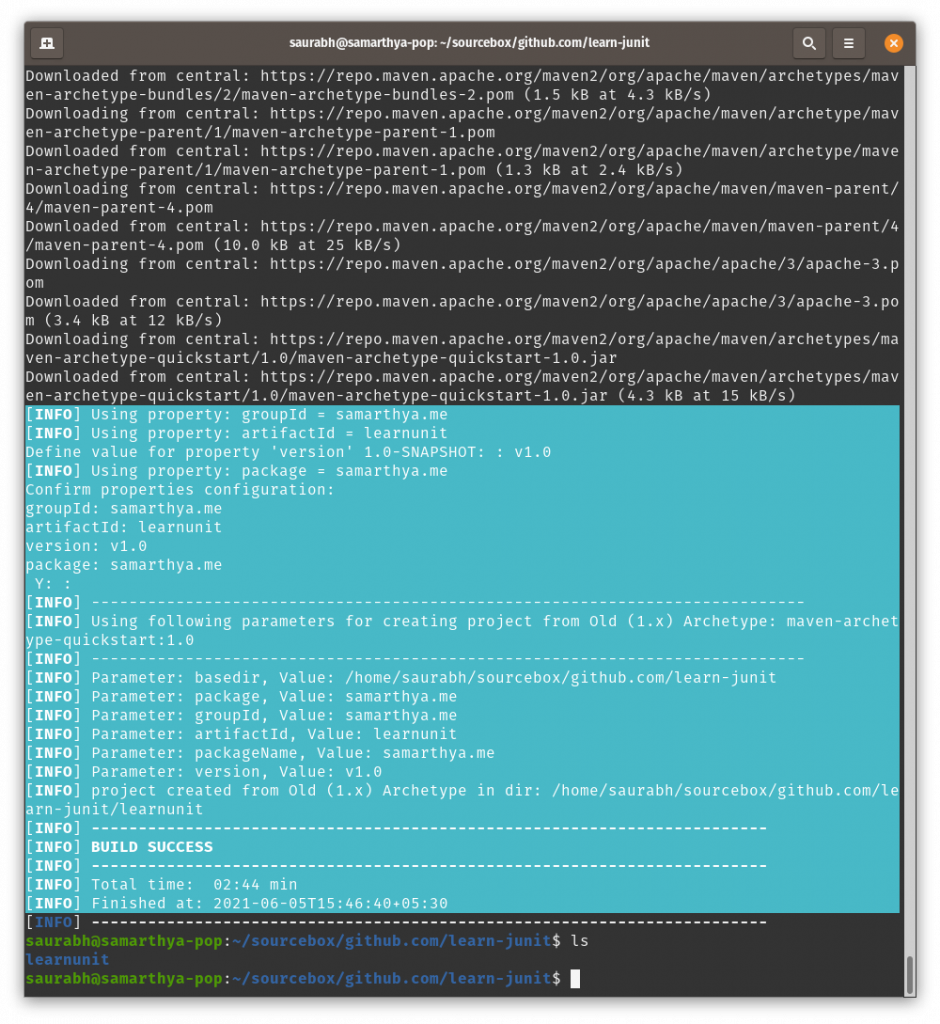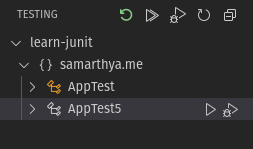JUNIT5: Learning how to write the code the right way!
JUnit was developed by Kent Beck and Erich Gamma. Its first version was released in 1997.
JUnit 5 = JUnit Platform + JUnit Jupiter + JUnit Vintage
https://junit.org/junit5/docs/current/user-guide/
It is powerful testing framework, with many modules. These modules are part of three sub-projects
- Junit Platform: Serves as a foundation for launching testing frameworks on the JVM.
- Junit Jupiter: It is the combination of the new programming model and extension model for writing tests and extensions in JUnit 5.
- Junit Vintage: Provides a
TestEnginefor running JUnit 3 and JUnit 4 based tests on the platform.
Let’s start a basic project structure
mvn archetype:generate -DgroupId=samarthya.me -DartifactId=learnunit -DarchetypeArtifactId=maven-archetype-quickstart -DinteractiveMode=true
In previous
JUnitversions, there was limited/no support to allow parameters in test constructors or methods. One of the major changes inJUnit 5Jupiter was that both test constructors and test methods are now allowed to have parameters.
POM: JUNIT4 Support
<project xmlns="http://maven.apache.org/POM/4.0.0" xmlns:xsi="http://www.w3.org/2001/XMLSchema-instance"
xsi:schemaLocation="http://maven.apache.org/POM/4.0.0 http://maven.apache.org/maven-v4_0_0.xsd">
<modelVersion>4.0.0</modelVersion>
<groupId>samarthya.me</groupId>
<artifactId>learnunit</artifactId>
<packaging>jar</packaging>
<version>v1.0</version>
<name>learnunit</name>
<url>http://maven.apache.org</url>
<dependencies>
<dependency>
<groupId>junit</groupId>
<artifactId>junit</artifactId>
<version>3.8.1</version>
<scope>test</scope>
</dependency>
</dependencies>
</project>Adding Libraries : JUNIT5
<project xmlns="http://maven.apache.org/POM/4.0.0" xmlns:xsi="http://www.w3.org/2001/XMLSchema-instance" xsi:schemaLocation="http://maven.apache.org/POM/4.0.0 http://maven.apache.org/maven-v4_0_0.xsd">
<modelVersion>4.0.0</modelVersion>
<groupId>samarthya.me</groupId>
<artifactId>learnunit</artifactId>
<packaging>jar</packaging>
<version>v1.0</version>
<name>learnunit</name>
<url>http://maven.apache.org</url>
<dependencies>
<dependency>
<groupId>org.junit.jupiter</groupId>
<artifactId>junit-jupiter-api</artifactId>
<version>5.7.2</version>
<scope>test</scope>
</dependency>
<dependency>
<groupId>org.junit.jupiter</groupId>
<artifactId>junit-jupiter-engine</artifactId>
<version>5.7.2</version>
<scope>test</scope>
</dependency>
<!-- https://mvnrepository.com/artifact/org.junit.vintage/junit-vintage-engine -->
<dependency>
<groupId>org.junit.vintage</groupId>
<artifactId>junit-vintage-engine</artifactId>
<version>5.7.2</version>
<scope>test</scope>
</dependency>
</dependencies>
</project>
JUNIT
JUNIT4: Test
package samarthya.me;
import junit.framework.Test;
import junit.framework.TestCase;
import junit.framework.TestSuite;
/**
* Unit test for simple App.
*/
public class AppTest
extends TestCase
{
/**
* Create the test case
*
* @param testName name of the test case
*/
public AppTest( String testName )
{
super( testName );
}
/**
* @return the suite of tests being tested
*/
public static Test suite()
{
return new TestSuite( AppTest.class );
}
/**
* Rigourous Test :-)
*/
public void testApp()
{
System.out.println("JUNIT4: Test");
assertTrue( true );
}
}JUNIT5: Test case
I will be using the @Test annotation that is from the package org.junit.jupiter.api.
package samarthya.me;
import static org.junit.Assert.assertTrue;
import org.junit.jupiter.api.Test;
class AppTest5 {
@Test
void test() {
System.out.println("JUNIT5: Test");
assertTrue(true);
}
}Not much is there, but you can execute the suite and see the output. I am using Visual Studio Code and launching test gives the result as below.


You can try some failures as below too..

SampleFunction
A trivial class with one sample function willReturnOne() that return one.
package samarthya.me;
public class SampleFunctions {
public int willReturnOne() {
return 1;
}
}
Help
- TestingEngine: https://junit.org/junit5/docs/current/api/org.junit.platform.engine/org/junit/platform/engine/TestEngine.html
